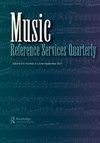在大流行病期间创办MLS,或如何生存、适应和克服项目疲劳
Q2 Arts and Humanities
引用次数: 0
摘要
摘要在这篇文章中,2020-2021年SMLG官员强调了在困难的情况下,在音乐图书馆领域建立一个由学生和新兴专业人士组成的社区的重要性。由于新冠肺炎病毒,即将进入印第安纳大学的美国职业足球大联盟音乐专业团队不得不迅速适应一年的在线课程。由于只有一半的新生在布鲁明顿,很难开始学习图书馆的三项动手技能:公共服务、技术服务和档案工作。此外,由于身体限制,了解项目中的每个人都是一件令人生畏和富有挑战性的事情。然而,音乐图书馆学生小组(SMLG)能够通过组织虚拟登记、临时聚会和专业发展会议来帮助缓解这些挑战,学生们可以在这些会议上与其他音乐图书馆员会面,讨论他们工作的独特方面。作者们还讨论了在这场危机中,他们如何继续培养必要的技能,以在我们选择的职业中取得成功,并就他们这样的学位项目未来可能如何适应提出了建议。本文章由计算机程序翻译,如有差异,请以英文原文为准。
Starting an MLS in the Midst of a Pandemic, or How to Survive, Adapt, and Overcome Program Fatigue
ABSTRACT In this essay, the 2020–21 SMLG officers emphasize the importance of building a community of students and emerging professionals in the field of music librarianship under difficult circumstances. Due to the COVID-19 virus, the incoming MLS Music Specialization cohort at Indiana University had to quickly adapt to a year of online classes. With only half of the incoming students physically in Bloomington, it was difficult to begin learning the trifecta of hands-on library skills: public services, technical services, and archival work. Additionally, it was daunting and challenging to get to know everyone in the program due to the physical restrictions. However, the Students of Music Librarianship Group, or SMLG, was able to help alleviate these challenges by organizing virtual check-ins, casual hangouts, and professional development sessions where students could meet other music librarians to discuss unique aspects of their jobs. The authors also discuss how, despite this crisis, they have continued to build the necessary skills to succeed in our chosen profession and offer recommendations for how degree programs like theirs might adapt in the future.
求助全文
通过发布文献求助,成功后即可免费获取论文全文。
去求助
来源期刊

Music Reference Services Quarterly
Arts and Humanities-Music
CiteScore
0.40
自引率
0.00%
发文量
30
期刊介绍:
Music Reference Services Quarterly is a refereed journal covering all aspects of the management and use of music collections and services in academic, orchestra, public, conservatory, and performing/fine arts libraries, as well as archives and museums. The Journal emphasizes research related to administration and management, bibliographic instruction, collection development, digital audio delivery, electronic resources, facilities, music librarianship education, preservation of music materials, reference services, cataloging, and bibliographies relating to printed music and audio-visual materials. The Journal publishes conceptual papers, literature reviews, practical case studies and opinion pieces. Regular columns include electronic resource reviews, book reviews and interviews.
 求助内容:
求助内容: 应助结果提醒方式:
应助结果提醒方式:


